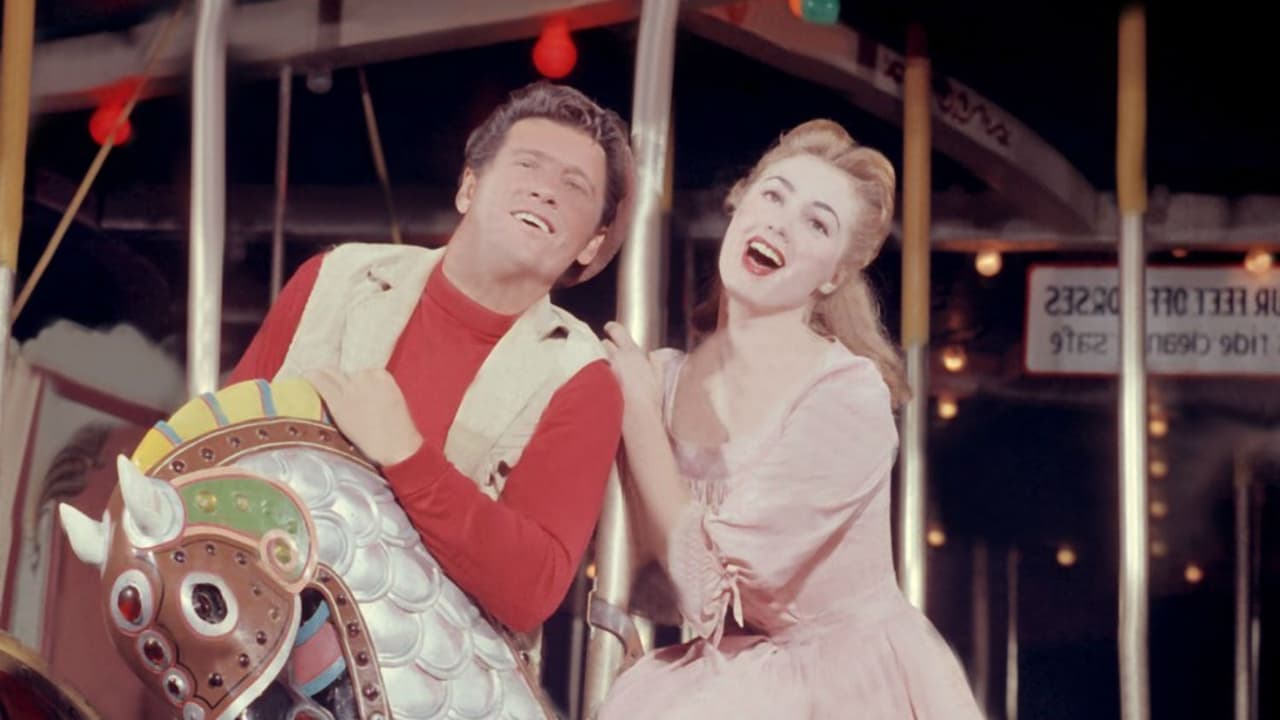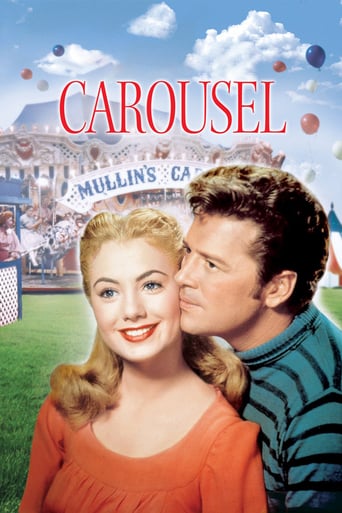

Thanks for the memories!
... View MoreExcellent, Without a doubt!!
... View MoreA brilliant film that helped define a genre
... View MoreIt's simply great fun, a winsome film and an occasionally over-the-top luxury fantasy that never flags.
... View MoreCarousel (1956): Dir: Henry King / Cast: Gordon MacRae, Shirley Jones, Cameron Mitchell, Barbara Ruick, Robert Rounseville: A carousel spins around in circles much like life's events and emotions. Gordon MacRae plays Billy Bigelow who is deceased in the film's opening but is given the opportunity to tell his story and return to earth for one day. He was a skilled carousel operator whose womanizing ways land him in trouble. Shirley Jones plays Julie Jordan who catches his eye and eventually becomes his wife. She becomes frustrated when he fails to change his ways with abusive behavior. Cameron Mitchell plays a sleazy criminal friend of Bigelow who makes an attempt to break up a relationship as well as con Bigelow into a crime. Barbara Ruick plays Julie's best friend who is getting married to Enoch Snow, played by Robert Rounseville. He is wealthy but unimpressed when his fiancé is being poached upon by Mitchell. Ruick is reduced to tears upon meeting Bigelow and his aggressive nature. Structure is rundown by too many pointless and meaningless musical numbers that never stand out. Another issue is the unpleasant disposition of the central character. We know how it ends and despite its corny delivery the production values work with director Henry King helming the wheel and preventing this musical charade from totally spinning out of control. Score: 7 / 10
... View MoreMy gut instincts are telling me that modern filmgoers aren't going to care for what I have to say about the 1956 Rodgers and Hammerstein musical, "Carousel". Most of the people reading this will find my opinion completely unacceptable. And in many respects, I can understand where people are coming from if they say that they didn't like this movie. If you have a permanent hatred for musicals, then "Carousel" is definitely not going to change your mind about the musical genre. And to be fair, even those who are big musical fans seem to be split on "Carousel". As for me personally, there are significant flaws about "Carousel" that I see as clearly as crystal. But as a big sucker for musicals, there are things that "Carousel" does extraordinarily well both on a visual level and on a musical level that are enough for me to consider it a guilty pleasure. It's important to note that Frank Sinatra was originally set to star as the main character of this picture. But due to the fact that he wasn't impressed with filming the same takes twice for two different cameras, he backed out. This is where "Oklahoma!" star Gordon MacRae comes in and takes over the role. And right out of the gate, I must say that this role seemed tailor made for Sinatra because MacRae does a heck of a job unintentionally impersonating his voice through this character. "Carousel" centers on Billy Bigelow (MacRae), a carousel barker with a bad reputation and a young mill worker named Julie Jordan (Shirley Jones) who both get fired from their jobs after essentially paying too much attention to each other one night. After being acquainted with each other against the wishes of their highly strict bosses, they fall in love and get married immediately. Yes, just after they meet each other for the first time that night, they get hitched three times faster than a typical Disney princess. Well, okay. So from there, we see them develop a meaningful and identifiable relationship, right? No, their character development gets sidetracked as Billy becomes bitter for being unable to find work and hits Julie in frustration one night, which isn't shown on screen. We get a subplot involving Billy and his pal Jigger (Cameron Mitchell) planning a robbery of a wealthy person in town, which will later have significant consequences. There's also barely a subplot with Julie's friend Carrie (Barbara Ruick) and her boyfriend Mr. Snow (Robert Rounseville). Basically the plot of "Carousel" is about a newly married couple that experiences some sort of trouble allegedly, with too many subplots added into the mix. And all of the plots, including the central love story between Billy and Julie, are so hastily rushed that any trace of character development is completely missing. Yeah, I would say to go ahead and just fast forward through anything resembling a plot since it's so messed up and very sloppy structure wise. But the problem is that the film practically did that for us before we even though about it! That is exactly how unconfident the director and writers seemed to be in terms of the plot to "Carousel". For that crucial aspect alone, I shouldn't be recommending "Carousel" especially considering the controversial developments that occur later in the plot. And yet here I am confessing that I have a soft spot for this flick. But to be fair, my recommendation is solely based on two things: the soundtrack by Rodgers and Hammerstein and the cinematography. Now you're thinking to yourself: that's not a good enough excuse to recommend a picture of this nature. But in this case, I'm making an exception. Whatever jaw dropping plot holes "Carousel" provides is made up for with the effort the filmmakers put into making this as great as it possibly can with everything else. The film's producer Henry Ephron really took advantage of the film's settings and made it as visually bright and atmospheric as possible for the big screen through the widescreen CinemaScope cameras. Say whatever you will about some of the settings being filmed on stage as opposed to on location. Any way you slice it, even the on stage sets have a specific beauty to them. I liked the setting where the "If I Loved You" number took place with the traces of blue light against the mountains, lake, and buildings along with the little pond that shows the character's reflections. But of course, the cinematography on location in Maine and California are magnificent. The "June Is Bustin' Out All Over" and "When the Children Are Asleep" numbers stand out when naming scenes at the top of my head where the on location cinematography is put to its best use. In both of these numbers, the skies look sensational, the sun is clearly present and shining on our stars and dancers, everything seems to be really happening. With "June Is Bustin' Out All Over", I got the sense that the dancers were really scaling that building back and forth without breaking a sweat. Amazing! And as for "When the Children Are Asleep", I never got the sense that it was all green screened. I was sold that Carrie and Mr. Snow were really controlling the boat the whole time. Nowadays, with all the green screens and CGI in the world and with barely a hint of movie musicals being made anymore, it's refreshing to look at a 1950's musical like "Carousel" to remind me of how magical movies during that era truly were. Though its plot is messy, I give it credit for at least not being another backstage musical. But above all, I love how everything else right down to the singing seems to be really happening on screen. Even if you end up not caring for this, just remember that "You'll Never Walk Alone". Boy, that closing song was awesome!
... View MoreGordon MacRae is Billy Bigelow, a smooth-talking carny barker who falls in love with a mill worker (Shirley Jones) on the colorful coast of Maine. Filmed on location, with a beautiful seaside setting as a backdrop and a thrilling score for accompaniment, their romance unfolds. But right before the birth of his daughter, Billy is killed while committing a robbery. Now in heaven, years later, he returns to earth for one day to attend his daughter's high school graduation and teach her one very important lesson.Like its immediate predecessor, Oklahoma!, this 1956 screen musical boasted then state- of-the-art widescreen cinematography, stereophonic sound, a starring romantic duo with on screen chemistry, and the Rodgers & Hammerstein imprimatur. Adding to its promise was a source (the venerable Ferenc Molnar play Liliom) that had already been filmed three times. Yet unlike the original Broadway production, and despite evident craft, Carousel proved a box- office disappointment. Why? Hindsight argues that '50s moviegoers may have been unprepared for its tragic narrative, the sometimes unsympathetic protagonist, and a spiritual subtext addressing life after death.
... View More"Carousel" is the musical version of the old film "Liliom"--a story that was filmed many times since 1919. While I've not seen either silent version, I have seen the Frank Borzage version (1930) and the French language version by Fritz Lang (1934). I wasn't impressed by either of these films--mostly because the leading character was pretty despicable. He's a very selfish character who horribly mistreats his poor wife--and I wonder how they can make this a romance with such a horrible guy, as it severely undermines the story. So, "Carousel" begins with a major handicap, as hating the leading character makes it hard to fall in love with the film.The film begins in New England. A very impressionable young lady (Shirley Jones) sees a handsome rogue (Gordon MacRae) at the carnival and the two inexplicably fall in love and decide to marry. I say inexplicably because he is a real womanizer and NOT the type to ever settle down. As for the marriage, it is a disaster--mostly because he is a ne'er-do'-well who is afraid to work or commit himself to his lovely wife. At times, such as when he learns he's about to become a father, he commits to changing but invariably he ends up returning to his old ways. Now I was a bit uncomfortable about this, as he apparently slapped his bride around--but they made LOTS of excuses for it, such as saying 'he's under a lot of pressure' or 'I only hit her once'! So much for a film that will empower the women in the audience! I just couldn't get past the fact he was a jerk who died while trying to rob someone! This story is apparently all part of some flashback. You see, MacRae's character is dead and he's telling this to the head honcho up in Heaven because he wants permission to return for one and only one brief period. Now considering most of the flashback consists of him acting like a clod, you wonder how this is all going to convince the powers that be to grant his request! As for the music, it's decent but the film clearly lacks the crowd-pleasing tunes of many of Rogers and Hammerstein's other works. "South Pacific", "Oklahoma" and the rest had more memorable songs--and didn't have to work so hard to compensate for an unlikable lead. Here, it's an uphill battle. Pretty, well made...but still a film that I had a hard time liking. Overall, it looks good but fails. Watchable but among the least in the Rogers and Hammerstein canon.
... View More